#linguistic discourse
Explore tagged Tumblr posts
Note
youre asking americans (people historically oppressed by the british) to actually care about the tiny nuances in your shitty accents and not make fun of you despite the fact that yall are, historically, the most oppressive people on the planet. do you hear yourself?
Hey so fun fact, classism isn’t okay no matter who you point it at ! I never said that the British Empire or the English royal family were not horrific colonial bloodthirsty pieces of shit. They are. Believe me, most English folk hate our own govt and royals just as much as the rest of you.
But there’s a difference between mocking the systems of power and the people in charge in this country who have colonized almost the entire planet and oppressed literally everyone they came into contact with and being a fucking asshole and punching at people who are ALSO being oppressed.
That’s the whole fucking point of the post! Do YOU hear yourself? Pull your head out of your ass and get some class consciousness maybe
Also “tiny nuances” mate, the nuances are fucking massive. You’re just an ignorant cunt.
@velvetvexations you’re an American, care to comment?
#politics#ukpol#uk politics#british politics#britpol#accent discrimination#accents#classism#Americans being insensitive about the struggles of any other country part 1738374847#who’s surprised anymore#discourse#political discourse#linguistics#linguistic discourse#culture
86 notes
·
View notes
Text
On the Identity of "Chat"
Like all the linguistics folks on Tumblr, I've been sent the "chat is a fourth person pronoun" post by a bunch of well-meaning people and and I've been thinking waaay too much about it. @hbmmaster made a wonderful post explaining exactly why "chat" ISN'T a fourth person pronoun, and after reading it I wanted to go a little deeper on what it might actually be doing linguistically, because it is a really interesting phenomenon. Here's a little proposal on what might be going on, with the caveat that it's not backed up by a sociolinguistic survey (which would be fun but more than I could throw together this morning).
On Pronouns
Studying linguistics has been really beneficial for me because understanding that language is constantly changing helped me to become comfortable with using they/them pronouns for myself. I've since done a decent amount of work with pronouns, and here are some basic ideas.
A basic substitution test shows that "chat" is not syntactically a pronoun: it can't be replaced with a pronoun in a sentence.
"Chat, what do we think about that?"
"He*, what do we think about that?" (* = ungrammatical, a native speaker of English would think it sounds wrong)
Linguists identify pronouns as bundles of features identifying the speaker, addressee, and/or someone outside the current discourse. So, a first person pronoun refers to the speaker, a second person pronoun refers to the addressee, and a third person pronoun refers to someone who is neither the speaker nor the addressee (but who is still known to the speaker and addressee). This configuration doesn't leave a lot of room for a "fourth" person. But the intuition people have that "chat" refers to something external to the discourse is worth exploring.
Hypothesis 1: Chat is a fourth-person pronoun.
We've knocked this one right out.
Hypothesis 2: Chat is an address term.
So what's an address term? These are words like "dude, bro, girl, sir" that we use to talk to people. In the original context where "chat" appears - streamers addressing their viewers - it is absolutely an address term. We can easily replace "chat" with any of these address terms in the example sentence above. It's clear that the speaker is referring to a specific group (viewers) who are observing and commenting on (but not fully participating in) the discourse of the stream. The distinction between OBSERVATION and PARTICIPATION is a secret tool that will come in handy later.
But when a student in a classroom says "wow chat, I hate this," is that student referring to their peers as a chat? In other words, is the student expecting any sort of participation or observation by the other students of their utterance? Could "chat" be replaced with "guys" in this instance and retain its nuance? My intuition as a zillenial (which could be way off, please drop your intuitions in the comments) is that the relationship between a streamer and chat is not exactly what the speaker in this case expects out of their peers. Which brings me to...
Hypothesis 3: chat is a stylistic index.
What's an index in linguistics? To put it very simply, it's anything that has acquired a social meaning based on the context in which it's said. In its original streaming context, it's an address term. But it can be used in contexts where there is not a chat, or even any group of people that could be abstracted into being a chat. Instead, people use this linguistic structure to explicitly mimic the style which streamers use.
And that much seems obvious, right? Of course people are mimicking streamers. It doesn't take a graduate degree to figure that out. What's interesting to me is why people choose to employ streaming language in certain scenarios. How is it different from the same sentence, minus the streamer style?
This all comes down to the indexicality, or social meaning, of streamer speak. This is where I ask you all to take over: what sorts of attitudes and qualities do you associate with that kind of person and that kind of speech? I think it has to do with (here it comes!) the PARTICIPANT/OBSERVER distinction. By framing speech as having observers, a speaker takes on the persona of someone who is observed - a self-styled celebrity. To use "chat" is to position oneself as a celebrity, and in some cases even to mock the notion of such a position. We can see a logical path from how streamers use "chat" as an address term to how it is co-opted to reference streamer culture and that celebrity/observer relationship in non-streaming mediated discourse. If we think about it that way, then it's easy to see why the "fourth person pronoun" post is so appealing. It highlights a discourse relationship that is being invoked wherein "chat" is not a group but a style.
1K notes
·
View notes
Text
Silmarillion Survey Essay!
My essay was due last night (submitted it with 6 minutes to spare!) and my professor said I could post it to Tumblr if I wanted to. It's divided into four sections, all marked. The first section is the introduction where I explain the point of the survey, who I studied, and why. The second section is the methods I used to design the survey, get answers, record answers, and control for variables. The third section is results, where I highlight several of the questions I thought would be most stratifying and explain what I actually found (it has graphs!). The fourth section is the discussion where I talk about what I found and what conclusions I drew from that.
I'd love to hear all of your thoughts on the results and my conclusions!
Introduction
For this project, I looked into age (and length of time in fandom, in one case) affected knowledge and attitudes about fandom language. I investigated several terms and phrases, both from fandom at large and from the Silmarillion fandom specifically. The group I studied was the fandom of The Silmarillion on Tumblr because I am intimately familiar with that internet space (and could therefore phrase the questions in a way that would be understood) and because the majority of Archiveofourown.org (a popular fanfiction website) users are also Tumblr users.
For the purposes of this paper, I am defining the Silmarillion fandom as a community of practice. The Wenger-Trayner article, “Communities of practice a brief introduction”, defines a community of practice as an entity with three parts: domain, community, and practice. The domain is “an identity defined by a shared domain of interest” (Wenger-Trayner 2). The domain in this case is The Silmarillion. As The Silmarillion is a history book set in a fictional universe, it is incredibly dry at times (there is an entire chapter titled “Of Beleriand and its Realms” which deals mostly with geography) so anyone who reads it by choice is necessarily interested in the work. The second part, community, is made up of “members [that] engage in joint activities and discussions, help each other, and share information” (Wenger-Trayner 2). Most fandoms engage in discourse/discussion, create transformative art (mostly written or visual, but I have seen musical as well) and exchange craft advice to better each other’s creative work, but due to the almost academic nature of the Silmarillion fandom, we exchange background lore knowledge, additions to Tolkien’s conlangs, translations, timelines, and character sheets in addition to the regular fandom activities. Finally, the Silmarillion fandom also has a shared practice, defined as “They develop a shared repertoire of resources: experiences, stories, tools, ways of addressing recurring problems—in short a shared practice” (Wenger-Trayner 2). As mentioned above, the Silmarillion fandom has shared resources (such as tolkiengateway.net, Nerd of the Rings on YouTube, as well as several established “fandom elders” who are happy to answer questions), stories, established characterizations for “only-mentioned-once-in-a-footnote” type characters, settled linguistic debates, and several research-oriented blogs (such as two of my own) that record niche or new knowledge about either Tolkien’s work or the fandom itself. Almost all of the above (with the possible exception of the website and the youtuber previously mentioned) is unpaid hobby work.
When doing this survey, I expected to find a rather steep difference between older and younger members of fandom regarding their knowledge of fandom terminology. I expected the 18-25 age group to be the most knowledgeable of fandom terms with the under 18 group to be only slightly behind them and the 26-30 group a slightly further way behind the under 18 group. For the groups over 30, I anticipated that the rate of knowledge would sharply decline and that older fans would be unfamiliar with fandom terminology for the most part. I was… incorrect.
Methods
There are eight questions highlighted in this paper. The first chart (Figure 1.) is the total percentage of answers that amounted to “I don’t know”, filtered by age. The first table (Figure 2.) looks at the people who did not know the term “Isekai” based on whether or not they were native speakers of English or live in Asia (given that “Isekai” is a Japanese word). The second table (Figure 3.) compares the percentage of people who mentioned that the word “angst” is also present in everyday German, categorized by German speakers and non-German speakers. The third table (Figure 4.) examines attitudes towards the anti/pro-ship terms based on age. The second chart (Figure 5.) examines attitudes towards the term “omegaverse” separated by age. The fourth table (Figure 6.) compares groups of people who could define the difference between “peredhel” and “peredhil”, separated by how long they have participated in the fandom surrounding the Silmarillion fandom. The third chart (Figure 7a.) looks at people who understand the phrase “Fëanor did nothing wrong” as a joke, filtered by age. Finally, the fourth chart (Figure 7b.) shows the percentage of people who used the phrase “tongue-in-cheek” in the 31-40 group as opposed to other age groups (that one was not explicitly asked for in the survey; I simply noticed a steep trend while dissecting the results from the “Fëanor did nothing wrong” question).
I compiled all of these questions (along with several others) in a google form as a three-part survey. The first part was comprised of basic demographic questions, the second of general fandom terms and phrases, and the third of terms and phrases specific to fanfiction of The Silmarillion. The 418 responses were recorded and examined in Google sheets, which I used to filter the demographic information for ease of synthetization.
The group I examined was people who participate in the Silmarillion fandom on Tumblr. I chose this group because I am familiar with them, because they are the most likely to be aware of these terms (due to the large overlap between Tumblr and Archive Of Our Own), and because fandom language is (to the best of my knowledge) not well studied. I was able to isolate this group by only posting the survey to Tumblr itself. Tumblr posts are only viewable to Tumblr users, so even if someone were to post a link to the post elsewhere, the only people able to access the survey would be Tumblr users. I further attempted to control by including several fandom related and The Silmarillion-specific questions in the demographic portion of the survey. Anyone who completed the demographic portion would have been well aware of the nature of the survey by the end, regardless of how poorly they understood the original survey posting. These measures, of course, did not stop everyone. I had a few respondents who submitted only the demographic portion or the demographic and general fandom portions. Luckily, due to the Google Sheets functions, such responses were relatively easy to filter out.
Results
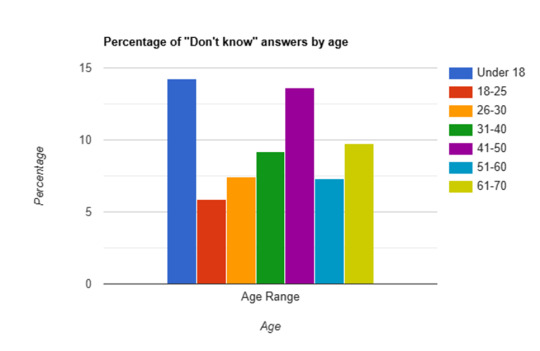
(Figure 1. A chart observing, out of all 16,065 answers, how many equate to “I don’t know?” Under 18: 14.24%, 18-25: 5.9%, 26-30: 7.43%, 31-40: 9.17%, 41-50: 13.63%, 51-60: 7.3%, 61-70: 9.7%)

(Figure 2. A table comparing different categories of people and what percentage of them are unfamiliar with the term “Isekai”; a Japanese term which is most commonly defined as “a trope in which a character somehow travels from the mundane ‘real’ universe into a fictional one.” 23.08% of native English speakers are unfamiliar with the term. 27.07% of non-native English speakers are unfamiliar with the term. 20% of respondents who live in Asia are unfamiliar with the term.)

(Figure 3. A table comparing different categories who mention that “Angst” (defined in fandom context as “dramatic, serious, and sometimes dark”) is an everyday word in German. 12.73% of German speakers mentioned it. 1.38% of people who either do not speak German, or did not mention it in their language background, mentioned it.)

(Figure 4. A table comparing the attitudes of different age groups to the terms “anti-ship” and “pro-ship”. These terms are hotly debated in fandom. Those on the anti side of the debate define anti-ship as “being morally against abuse and pedophilia,” and pro-ship as “excusing abuse and pedophilia in fandom.” Those on the pro side of the debate define anti-ship as “puritanical and chronically online people who can’t separate reality and fiction” and pro-ship as “letting people ship whatever they want and separating reality from fiction.” Those under 18 are 4% anti, 4% pro, and 92% neutral. Those from 18-25 are 2.44% anti, 29.27% pro, and 68.29% neutral. Those from 26-30 are 0% anti, 33.67% pro, and 66.33% neutral. Those from 31-40 are 2.2% anti, 26.37% pro, and 71.43% neutral. Those from 41-50 are 0% anti, 46.15% pro, and 53.85% neutral. Those from 51-60 are 12.5% anti, 37.5% anti, and 50% neutral. Those from 61-70 are 0% anti, 50% pro, and 50% neutral (although, admittedly, there are only two respondents in that group.))
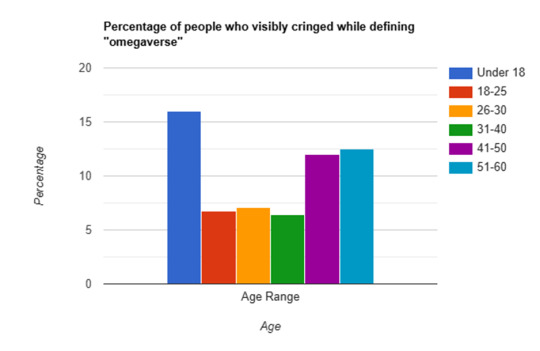
(Figure 5. A chart that shows the rate at which respondents cringed (using phrases such as “please don’t make me define this,” “oh god,” and “Nuh uh. Sorry man. Sweet baby rays good lord.”*) within their responses while defining “Omegaverse” (an erotica subgenre within fandom based on outdated wolfpack dynamics. Very popular, but also very taboo). Under 18: 16%, 18-25: 6.71% 26-30: 7.07%, 31-40: 6.45%, 41-50: 12%, 51-60: 12.5%)
*All real responses I received
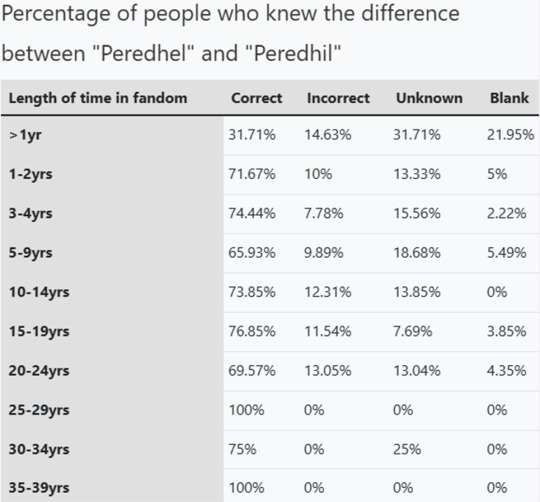
(Figure 6: A chart exploring the differences between who can correctly identify the difference between the terms “peredhel” (half-elf, singular) and “peredhil” (half-elves, plural) based on how long they have been in the fandom. Those who have been in the fandom for less than a year are 31.71% correct and 14.63% incorrect. Those who have been in the fandom for 1-2 years are 71.67% correct and 10% incorrect. Those who have been in the fandom for 3-4 years are 74.44% correct and 7.78% incorrect. Those who have been in the fandom for 5-9 years are 65.93% correct and 9.89% incorrect. Those who have been in the fandom for 10-14 years are 73.85% correct and 12.31% incorrect. Those who have been in the fandom for 15-19 years are 76.92% correct and 11.59% incorrect. Those who have been in the fandom for 20-24 years are 69.57% correct and 13.04% incorrect. Those who have been in the fandom for 25-29 years are 100% correct and 0% incorrect. Those who have been in the fandom for 30-34 years are 75% correct and 0% incorrect. Those who have been in the fandom for 35-39 years are 100% correct and 0% incorrect.)
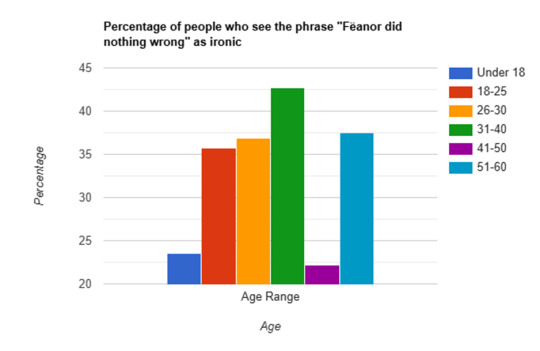
(Figure 7a. A chart observing who sees the phrase “Fëanor did nothing wrong as ironic” divided by age. Under 18: 23.53%, 18-25: 35.77%, 26-30: 36.9%, 31-40: 42.67%, 41-50: 22.22%, 51-60: 37.5%)
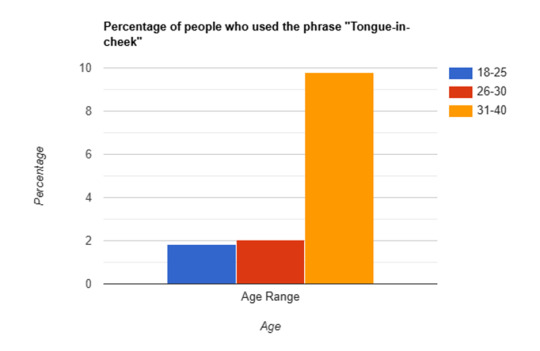
(Figure 7b. A chart observing the percentages of age groups who used the phrase “tongue-in-cheek” while answering the above question. 18-25: 1.84%, 26-30: 2.04%, 31-40: 9.78)
Discussion
Observing these results, I can see that, while there is some level of stratification by age and length of time spent in the fandom, it is not nearly as dramatic as I had expected it to be. These results strongly demonstrate the power of communities of practice. These people, across ages and continents, communicate so often and so deeply, that nearly all terms are understood to the same degree by everyone, and nearly everyone has similar stances on divisive pan-fandom debates.
Were I to do this study again, or a similar study in the future, I would probably narrow the purview by a lot. I would ask fewer questions (or at least, only ask questions of a single type), compare them against only one demographic question, and sincerely consider making them multiple choice. That being said, I do not regret this survey having short answer questions. There were several definitions of several terms that I never could have come up with in a million years. Synthesizing the short answers may have taken more effort on my part, but I learned a lot about my fandom.
@proship-anti-discussion (ship debate was mentioned)
#silmarillion#fandom#linguistics#survey says#silmarillion survey#fandom survey#academia#nerd shit#graphs#charts#tables#isekai#angst#antishiping#proshipping#omegaverse#peredhel#peredhil#feanor#fëanor#fëanor did nothing wrong#fandom discourse#fandom meta
83 notes
·
View notes
Text
Twink is the most misused and abused word in the entire English language.
#misused#english language#english langblr#language#etymology#linguistics#language stuff#langblr#queer#queer queer queer#queer thoughts#queer issues#queer pride#queer stuff#queer discourse#queer drama#queer humor#queer jokes#queer life#queer community#lgbtq#lgbtqia#lgbtq community
18 notes
·
View notes
Text
dgmw like i do think think that the split attraction model and the creation of hyper-specific identity labels for describing how one relates experientially to sexual attraction are like, Politically Corrosive to any useful understanding of 'queerness'. but "what if the Wrong Kind Of People think theyre queer" is not a fucking issue that should be on your radar here
#genuinely the stupidest part of the Ace Discourse era was its sole focus on 'who gets to lay claim to Queerness'#meowmeow#linguistic terrorism
14 notes
·
View notes
Text
Every once in a while, I find myself returning to two core texts: The Body in Pain: The Making and Unmaking of the World by Elaine Scarry and the essay A Dangerous Individual by Michel Foucault.
..........
In the Body in Pain, Scarry explores the relationship between physical pain, language, and power. Her central argument is that pain is uniquely difficult to express and, as a result, it isolates individuals. Pain has a destructive capacity—it can unmake a person's world, reducing them to a state where communication fails. Conversely, creativity and expression have the power to remake the world, to construct shared meaning.
Scarry also delves into how pain is used as a tool of power—most explicitly in contexts like torture. For her, torture is the deliberate unmaking of a person's world, an extreme form of control and domination. The inexpressibility of pain, its resistance to language, becomes a means through which authority asserts itself.
Foucault's essay A Dangerous Individual explores the relationship between power, knowledge, and the concept of the "criminal" or "deviant." His analysis is rooted in the idea that society defines and categorizes individuals to regulate behavior, creating and controlling "dangerous" identities. This labeling process is a method of discipline that extends beyond the legal system into broader cultural and social norms.
Foucault sees power not merely as repressive but as productive—it generates knowledge, shapes identities, and constructs norms. The "dangerous individual" becomes a category through which power operates, justifying surveillance and control. Foucault also connects this to the management of the body, arguing that the body is a site where power is exercised and inscribed.
#michel foucault#elaine scarry#the body in pain#philosophy#the dangerous individual#discourse analysis#linguistics#language
8 notes
·
View notes
Text


Today I decided to learn SFL and CDA because my work climate is not fun 🤕
#sfl#studyblr#academia#dark academia#critical linguistics#critical discourse analysis#fairclough#wodak#halliday#livinthebookshelf#the tortured poets department#thank you aimee
29 notes
·
View notes
Text
I think it's about time that we put away the "chewsday" and "bo'ol o' wa'ah" jokes.
It's frankly quite an overused and tired joke, but not only that, it's incredibly classist.
In the UK, accents are and always have been very heavily entwined with the country's class system. There is an extremely long and storied history of certain accents (such as the popularly-mocked cockney) being brutally ridiculed, suppressed in the public sector, and even banned from media and broadcasting while others like RP were promoted and even required.
This has lessened over time, but it still holds pretty true: Your accent is one of the main indicators of your class and your breeding, and will directly impact the way that people treat you.
These are historically marginalised and oppressed accents in the UK, so when you mock them— especially as someone who does not live in the UK— you are, in fact, directly mocking those people to whom the accent belongs.
Personally, I have a very sensitive history surrounding my accent. I was born into a working-class family, but my father was a social climber and intensely embarrassed about his own status. Because of this, he had an intense fixation with ensuring that I fit every classist mould of an upper-class child. I was heavily abused by my teachers as a child into speaking in a Received Pronunciation accent (which they regarded as the "proper" way to speak), and was physically beaten into learning to write in an "educated style."
It took me until I was about sixteen or seventeen to even begin feeling comfortable to speak in my natural accent in the comfort of my own home. When in groups or in front of crowds, I still revert to a softer RP accent. I still have chronic pain in my hands from the beatings I received, and I still refuse to write on paper because it causes PTSD flashbacks.
All this to say: As an American, or generally anyone from outside of the UK, you do not have the right to mock historically marginalised British accents. It is not funny. You are pressing on a bruise that is not yours to press on, and then mocking people when they tell you that you pressing on that bruise hurts.
If you want to mock an English accent, mock RP. Traditional, Broadcasting, Aristocratic, or Modern. Those are historically upper-class accents, which (for most people) have no heavy history attached to them. I would say it's fair game.
But when you mock the accents of the poor working class who have been unequivocally brutalised in this country for centuries and then go on to mock us when we try to tell you why we don't like you doing it, you just sound like a complete and utter asshole.
#tw abuse mention#classism#accents#linguistics#discourse#British history#debate hall#ozz bitches#accent discrimination#civil rights#oppression#uk politics#ukpol#british politics#sociology
321 notes
·
View notes
Text
trans woman: Please don't call me dude.
Some guy: When trans women tell me not to call them dude they fail to understand that I am a Tocharian peasant and here in Kuśi we use wrassom as a gender neutral term.
#linguistics#linguistic#languages#shitpost#lingblr#linguist shitpost#transfem#transgender#dude discourse
18 notes
·
View notes
Text
Just finished dissecting the proship vs antiship results. I won't post them now (because I need to sleep) but I have a few Thoughts.
First, apparently the "anti-ship" side of this debate is COMICALLY overinflated (at least in the silm fandom). Out of 418 respondents, I think maybe 5-10 had a slight anti tilt? Maybe not even that many?
Also, 26-30yo's, you're not that old. I promise! Don't go blaming "kids these days" for fandom problems, they're not THAT much younger than you.
Speaking of the young'ns, we... really can't blame them for this one 🤣 Most of them Don't Know What It Is! (Seriously, I think 15/20 either put "idk" or left it blank)
Finally, Fandom Olds (41-50 mostly) came in clutch with this one! I've never seen such scathing remarks about purity culture and I am HERE for it!
#survey says#fandom discourse#anti ship#antiship#anti-ship#pro ship#proship#pro-ship#ageism#statistics#linguistics
14 notes
·
View notes
Text
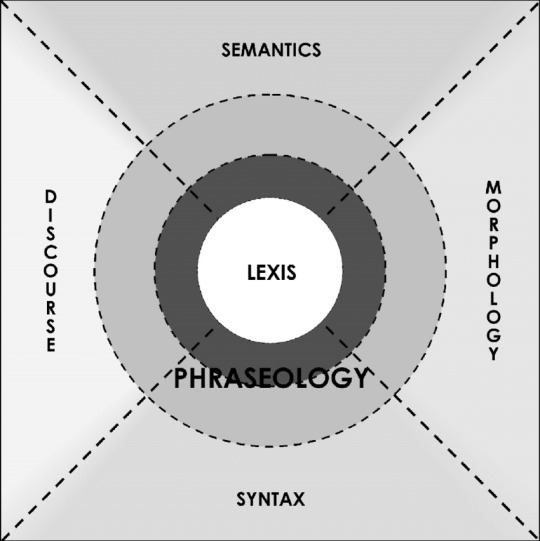
Phraseology wide and narrow (Granger, Sylviane & Paquot, Magali. (2008). Disentangling the phraseological web. 10.1075/z.139.07gra.)
24 notes
·
View notes
Text
A Linguistic Analysis: Manga Translation (EN/JP/TWN) Comparison of Chapter 90.1 | Part 3
This is written in response to @connoisseursdecomfort's post Comparing Versions of Short Mission 11
((I realized that I should have just made this into a post because my response would be lost as a reblog. And it did... OTL
Also, this is an updated version with more insight/details))

Consider this is as a part 3 of my Linguistic Analysis posts on Spy x Family's Ch. 90.1 or Short Mission 11.
Part 1: A Linguistic Analysis of the Spelling "Ania" and "Anya"...
Part 2: "Ania" is the closest to an identity reveal
This analysis contains spoilers from Chapter 90.1 / Short Mission 11!
What's so interesting about the discourse analysis amongst Japanese, Taiwanese, and English translations is the hedging (word choices that lessen the directness of a dialogue) langauge that Loid uses. It is more clear in the Japanese ("by the way") and Taiwanese ("it came to mind") translations. Whereas, English's hedging is found in "...right?" What the three of them do share in common is that Loid's discourse is pointing to active voice by stating "your name is spelled A-N-Y-A". Apply all of these translations below:
(ENG) Your name is spelled A-N-Y-A, right?
(JP) By the way, your name is spelled A-N-Y-A.
(TW) It came to mind, your name is spelled A-N-Y-A.

It is consistent that Loid's tone is holding authority by demonstrating his knowledge on Ostanian orthography based off the transcriptions he's seen of Anya's name registered as "A-N-Y-A" which was spelled by her previous Ostanian adopted parents. So Twilight feels confident that the spelling of her name MUST be "Anya."
Another thing I wanted to add on to @connoisseursdecomfort's observation is catching loss of translation, which is so unfortunately common. English translation omits translations mainly because some expressions or dialogue that are common in a language (Japanese and Taiwanese) would be perceive differently in English-speaking countries (USA, UK, AUS, CAN, etc.). This is called cultural discount.
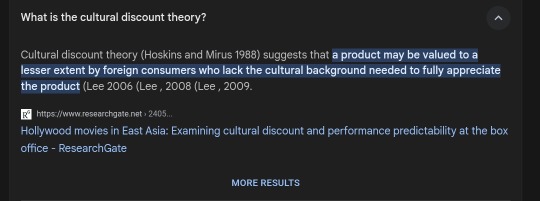

It's the reason why Squid Game English dub missed out on many jokes that are play on words in the Korean dub. It is also the reason why a lot of American jokes are not understood by non-English speakers OTL

But this is a general phenomenon because English native consumers would find the expression strange simply because we do not have this style reflected in our discourse. The best example is when @_mika60 translated the omitted text "Anya's heart stirred at the mention of her own name."
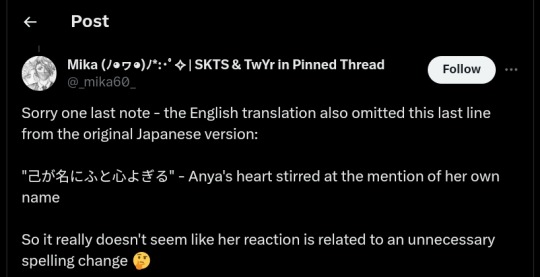
To an American (possibly English natives in general, but I can't really speak on behalf of British, Canadians, nor Australians beause their English may be slightly different in terms of cultural lifestyle/upbringing), this expression can be perceived as corny/purple-prosey. Because American discourse don't generally have this emotionally-charged reflective discourse. Hence, omitted. Which is unfortunate because it says so much about how Loid's spelling affected Anya's feelings. So this is a perfect example of cultural discount.
An example of loss in translation is the omission of Anya's text which explains why she can't carve out her name is due to feeling insecure about her bad handwriting. (Again, this is character analysis that English-reading consumers missed out on! Because anything written in the manga is deemed canon.) Whereas English, we completely omit that detail because English native speakers don't need that extra dialogue. The English discourse is typically straight to the point and English native consumers draw inferences from icons (images/illustrations).

Based off my explanation, this is how I see the above picture as an American consumer (using a think-aloud method):
Anya says, "I can't do it right..." and she looks frustrated as illustrated by the swirl above her head.
Her brows are furrowed which supports that she's annoyed/frustrated/angry.
Her cheeks... are they blushes? Is she embarrassed? I can't really tell.
She's also a 4 y/o or was it 5 y/o child (she lied being 6, right?) so it's obvious she probably might be annoyed because she can't draw straight lines.
Because she's an infant, I'm sure she doesn't have the strength to draw clean lines.
Based off my thought process above, do I think OR am I convinced that Anya feels insecure? No.
Can it be argued that she's insecure? Yes, absolutely.
If I were to talk to someone who posits Anya may be insecure because of his/her knowledge of children behavior and/or mannerism, then I would be convinced. However, I would arrive to this assimilation through negotiating observations and exchanging knowledge of children behavioral mannerism. However, this would become more of headcanon if it wasn't explicitly stated in the manga (keep it mind that the Japanese translation DOES explicitly state that she's insecure because of her bad handwriting, so yes, it is canon that Anya is insecure of her bad handwriting).
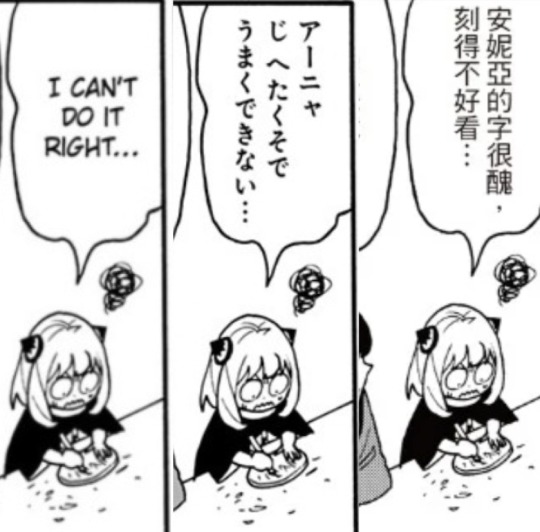
Anyways...
I love translation comparisons mainly because you get to experience cultural exchange if you are fortunate enough to understand or have access to a translator (*cough* @connoisseursdecomfort *cough*) who enjoys comparing multiple languages. Thank you for doing God's work @connoisseursdecomfort <3
#spy x family#spy x family spoiler#spy x family manga spoiler#spy x family chapter 90.1#short mission 11#loid forger#twilight#anya forger#sxf#analysis#linguistics#scarlywroteathing#updated analysis#discourse analysis#loss in translation#cultural discount
48 notes
·
View notes
Text
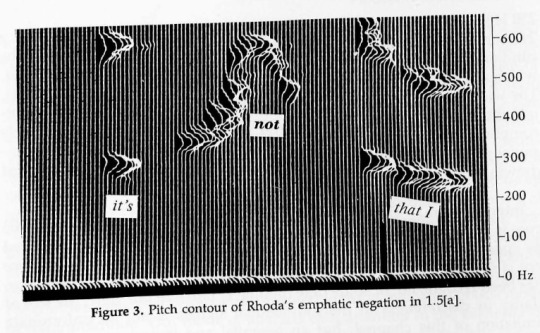
Pitch trace of the utterance "it's not that I", showing a peak on the negation not. A funky way of illustrating pitch? Pitch before Praat?
Labov, William & David Fanshel. 1977. Therapeutic discourse: psychotherapy as conversation. New York: Academic Press. [Figure 3, page 45]
A footnote explains the visualization this way: "Spectral Dynamics Real-Time Analyzer 301C with output displayed on a Tektronix 611 storage oscilloscope. The analyzer synthesizes 500 filters every 50 milliseconds over a variety of frequency ranges; the analysis can be terminated after any given number of filters and a new sweep started immediately. The pitch contour display used throughout this volume is made with a frequ ency range of 5,000 Hz. Each filter has a nominal bandwidth of 10 Hz and an effective bandwidth of 15 Hz. The sweep is terminated after the first 110 filters, so that a spectrum is generated every 11 milliseconds. The display on the oscilloscope is logarithmic and cuts off at 54 db below maximum. High-pass filtering at 12 db per octave begins at 3,000 Hz, and, in addition, the roll-off of the Nagra IV-S tape recorder - LS + FA - is used. Volume is then adjusted so that only the peaks of the wave forms are visible, thus tracing the path of the fundamental frequency without the interference of other signals"
#linguistics#phonetics#pitch#acoustics#William Labov#David Fanshel#1977#Therapeutic discourse#Academic Press
16 notes
·
View notes
Text
has there ever been a more useful piece of punctuation than lol. perfect end to any sentence. perfect way to start your sentence when you're trying to be nonthreatening. goes well with sob. just a nice phatic word like an emoji that contributes nothing but signifies affability and willingness to participate. beautiful discourse marker showing benevolence and creating empathy. equivalent of the upturned palm in buddhist iconography that means "giving no harm" lol
7 notes
·
View notes
Text
sometimes i get worried im not in the right academic field and then i think about another form of discourse analysis to dig into and i get all excited again
#thinking about the use of language in science fiction!!! specifically settings that are supposed to be near-ish earth future#like the use of english and chinese in firefly#and the belter creole in the expanse#i think it's so cool... but i cannot let that distract me from my current thesis topic#i think i've finally decided my subfield within a subfield is discourse analysis#like linguistics -> sociolinguistics -> discourse analysis#bc im not as concerned about like. what particular features are being used. im more concerned about WHY they're being used#what does this mean on a broader scale?#what does it say about language ideologies? in fiction what does it mean for the characters and setting?#i love u linguistics.....
14 notes
·
View notes
Text
“Eskimo” both is and is not a slur.
In Greenland and Canada it is more unequivocally offensive, whereas in Alaska some Iñupiat and Yupiit—though far from all—do indeed use this exonym for themselves in English, particularly more rural or elderly speakers. The Alaska Eskimo Whaling Commission, for instance, uses it in their name. Edna Ahgeak MacLean, a foremost Iñupiaq language authority, uses it occasionally in her work. It is the established academic term for the collective Inuit-Yuit branch of the Inuit-Yuit-Unangan or “Eskimo-Aleut” language family. “Eskimo” does not refer to Inuit alone, but is an umbrella term for Iñuich and Yupiit together, one that colloquially excludes Sugpiat, who are otherwise known as “Alutiit,” along with Unangan, otherwise known as “Aleuts,” who both prefer those Russian-derived “Алеуты” exonyms over the “Esquimaux” one. The ethnonym “Inuit” more properly applies only to Iñupiat and other Iñuich, not to Yupiit as well. The words Inuit and Yuit are cognates, but exonyms in each other’s respective languages. The difference between Iñupiatun and Yugtun is said to be roughly comparable to that between English and German: obviously related languages, but not mutually intelligible, having diverged around 1000 CE; Unangam Tunuu diverged earlier, around 2000 BCE. “Inuit and Yupiit” is in generalized circumstances the most accurate substitution for “Eskimo” as it does not conflate two distinct Indigenous peoples under the name of one.
The etymology of the exonym is furthermore disputed. Its origin may be from the Innu-aimun word ayas̆kimew “person who laces a snowshoe,” or from another Innu-aimun word that is not a reference to diet.
That said, I would like to reinforce the message that non-Native people shouldn’t use “Eskimo kisses, ice cream,” etc. as casual terms disconnected from the relevant Native cultures, nor use diminutive forms of the ethnonym. Such usages are pejorative. While it is for the most part rude to correct people on their own terminology for themselves, I urge non-Native people to use Native endonyms over exonyms wherever possible, and not to evoke actual peoples as stereotypes.
9 notes
·
View notes